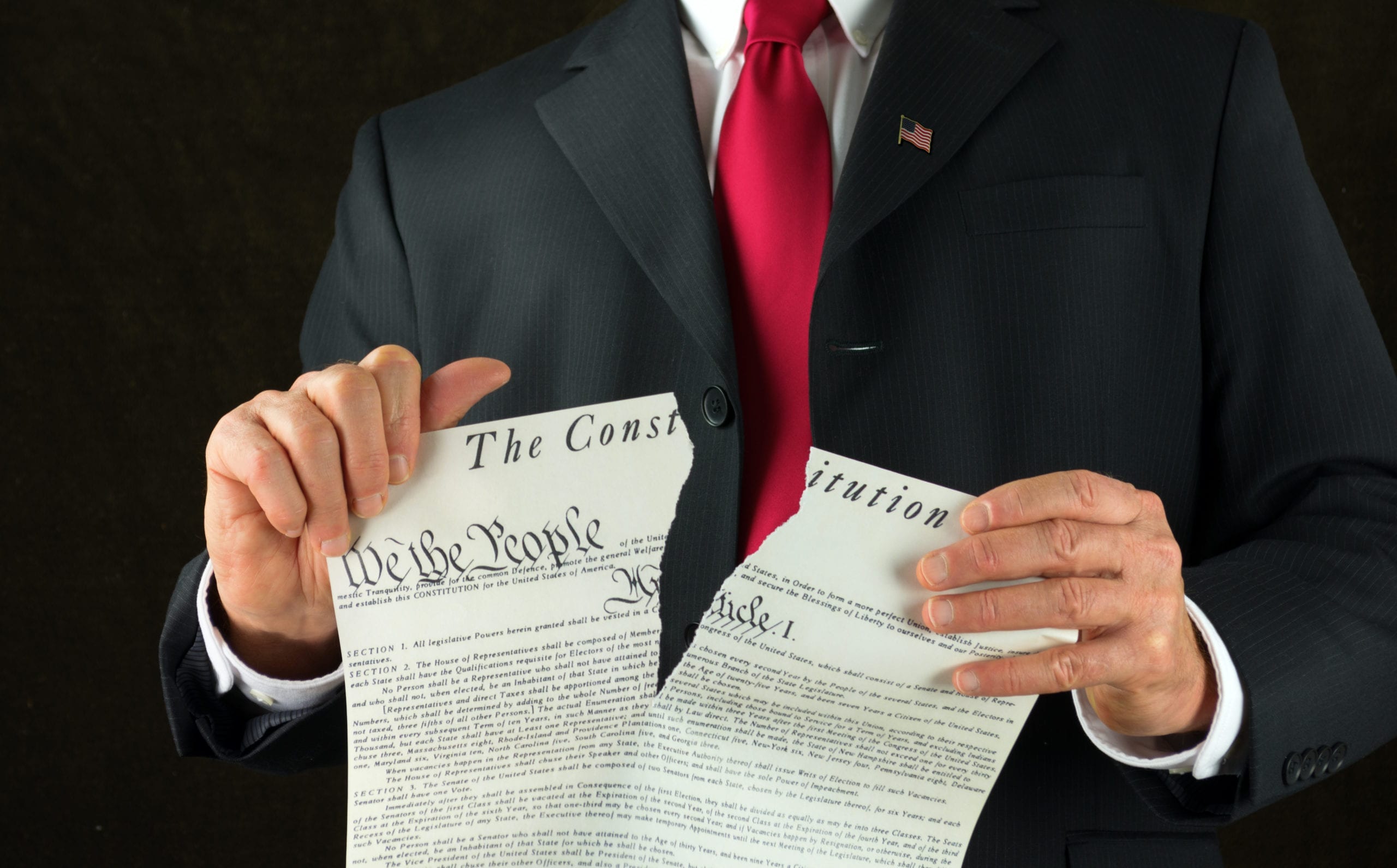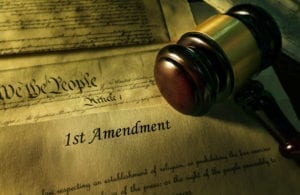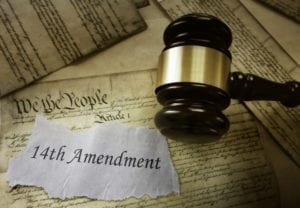BRIAN J GRABER LLC is a public employee civil rights lawyer representing public employees in Illinois, Indiana, and Michigan for violations of their civil rights under the 1st and 14th Amendments to the U.S. Constitution. Public employees have civil rights protected under the U.S. Constitution. In addition to the protections under Title VII of the Civil Rights of 1964, the Illinois Human Rights Act, and various other statutes, public employees working for State and local governments have certain employment rights protected by the U.S. Constitution. 42 U.S.C. §1983 is the primary federal civil rights enforcement statute used to provide a private remedy for certain employment rights protected by the U.S. Constitution abuses committed by State officials and employees of municipal governments. 42 U.S.C. §1983 provides as follows:
Every person who under color of any statute, ordinance, regulation, custom, or usage, of any State or Territory or the District of Columbia, subjects, or causes to be subjected, any citizen of the United States or other person within the jurisdiction thereof to the deprivation of any rights, privileges, or immunities secured by the Constitution and laws, shall be liable to the party injured in any action at law, suit in equity, or other proper proceeding for redress . . . .
§1983 does not create any independent constitutional rights. §1983 is a statute that imposes liability on government officials and local governments for violating a public employee’s constitutional rights. A public employee making a claim under §1983 must prove a violation of his or her constitutional rights.
The term “person” used in §1983 is broadly construed to include both individuals and local governmental entities. The elements of proof for a §1983 claim are different for claims brought against an individual government employee compared to §1983 claims brought against a municipality or against a government official in his/her official capacity (official capacity suits mean the municipality is the real party, not the individual official). Government officials sued in their individual capacities may have various qualified or absolute immunity defenses to liability under §1983.
Generally, local governments such as municipalities cannot be held liable under §1983 vicariously by application of the doctrine of respondeat superior for the unconstitutional acts of its employees. See Monell v. Dept. of Soc. Servs., 436 U.S. 658, 694 (1978). It is when execution of a government’s policy or custom, whether made by its lawmakers or by those whose edicts or acts may fairly be said to represent official policy inflicts the injury that the government is responsible under §1983. In Phelan v. Cook County, 463 F.3d 773, 789 (7th Cir. 2006) the court held actionable policies or customs under §1983 take three forms:
- Express policy that, when enforced, causes a constitutional deprivation;
- A widespread practice that although not authorized by written law or express municipal policy is so permanent and well settled as to constitute a custom or usage with the force of law; or
- An allegation that the constitutional injury was caused by a person with final policy-making authority.
These added elements of proof for a §1983 constitutional claim are why most employment claims involving employment discrimination are brought under Title VII and the Illinois Human Rights Act (IHRA) against local governments because none of these additional elements of proof are required for Title VII and IHRA claims.
If you believe your public employer violated your constitutional rights, contact BRIAN J GRABER LLC, a public employee civil rights lawyer at the Illinois office: (312) 291-4648 or the Indiana office: (574) 395-5189 or the Michigan office: (269) 230-6054 or by email to schedule your confidential consultation.
STATUTE OF LIMITATIONS FOR §1983 CLAIMS
42 U.S.C. §1983 does not have a statute of limitations. A statute of limitations sets the maximum time period in which certain constitutional rights can be enforced under §1983 against responsible parties. After the period has run, no legal action can be maintained to enforce any constitutional rights under §1983 against the responsible parties. The Supreme Court has ruled that in order to determine the proper statute of limitations for §1983 claims a federal court must adopt the forum State’s statute of limitations for personal injury claims. Wilson v. Garcia, 471 U.S. 261, 276 (1985). In Wallace v. Kato, the U.S. Supreme Court held as follows:
Section 1983 provide a federal cause of action, but in several respects relevant here federal law looks to the law of the State in which the cause of action arose. This is so for the lenght of the statute of limitations: It is that which the State law provides for personal-injury torts.
Wallace v. Kato, 549 U.S. 384, 387 (2007).
The 7th Circuit Court of Appeals has consistently held that the appropriate statute of limitations for §1983 cases filed in Illinois is 2 years as set forth in 735 ILCS 5/13-202. Ashafa v. City of Chicago, 146 F.3d 459, 461 (7th Cir. 1998). In Indiana, Section 1983 claims must be brought within 2 years pursuant to I.C. 34-11-2-4. See Serino v. Hensley, 735 F.3d 588, 590 (7th Cir. 2013). Section 1983 claims arising in Michigan are subject to Michigan’s 3-year statute of limitations for personal injury claims. See Werske v. City of Detroit, Michigan, 112 F.4th 357, 365 (6th Cir. 2024).
PUBLIC EMPLOYEE 1ST AMENDMENT PROTECTIONS
Citizens do not surrender their 1st Amendment rights by accepting public employment. Lane v. Franks, 573 U.S. 228, 231 (2014). Public employees do not relinquish 1st Amendment Rights to comment on matters of public interest by virtue of government employment. Connick v. Meyers, 461 U.S. 138, 140 (1983). It is well settled that hiring, firing, or transferring government employees based on political motivation violates the 1st Amendment, with certain exceptions for policymaking positions and for employees having confidential relationships with a superior. Hall v. Babb, 389 F.3d 758, 762 (7th Cir. 2004). The 1st Amendment protections are applied to local governments by incorporation of the 14th Amendment.
Certain U.S. Supreme Court decisions have limited the application of the 1st Amendment protections for public employees. Supreme Court decisions on the 1st Amendment Protections generally protect public employees’ speech on matters of public concern. See Garcetti v. Ceballos, 547 U.S. 410, 417 (2006) (1st Amendment protects a public employee’s right, in certain circumstances, to speak as a citizen addressing matters of public concern). Whether a public employee’s speech is a matter of public concern is a question of law for the court to resolve.
The Supreme Court held in Garcetti, 461 U.S. at 421, that a public employee who makes a statement pursuant to his/her official duties is not protected by the 1st Amendment, because the public employee is not speaking as a citizen for 1st Amendment purposes, and the Constitution does not insulate their communications from employer discipline. If a public employee’s statement is not made pursuant to his/her official duties, the speech could be protected if the public employee’s speech was on a matter of public concern and his/her interest in the speech outweighs the public employer’s interest in promoting the efficiency of its public services. The issue of whether a public employee engaged in 1st Amendment-protected activity is a question of law for the court to resolve. If the court determines that a public employee engaged in 1st Amendment-protected activity, the public employee must generally prove the following elements:
- The defendant intentionally took adverse action against the plaintiff, for example, fired the plaintiff.
- The plaintiff’s protected speech was a reason that the defendant took the adverse employment action. It need not be the only reason.
- The defendant’s retaliatory conduct would likely deter an ordinary employee in the plaintiff’s circumstances from engaging in similar speech.
If the plaintiff proves these elements he or she may prevail unless the defendant can prove by a preponderance of the evidence that there were other reasons that would have led the defendant to take the adverse employment action even if the plaintiff had not engaged in the protected speech.
Public employers cannot take adverse action against public employees based on their political association. Generally, a public employee must prove each of the following elements:
- Plaintiff’s political affiliation;
- Defendant intentionally fired or refused to hire or promote;
- Plaintiff’s political affiliation was a reason that Defendant fired or refused to hire or promote. It need not have been the only reason.
- The defendant’s retaliatory conduct would likely deter an ordinary employee from the political association.
If the plaintiff proves these elements he or she may prevail unless the defendant can prove by a preponderance of the evidence that there were other reasons that would have led Defendant to take the adverse employment action against the plaintiff even if the plaintiff had not engaged in the protected activity.
If you believe your public employer violated your 1st Amendment Constitutional rights, contact BRIAN J GRABER LLC, a public employee civil rights lawyer at the Illinois office: (312) 291-4648 or the Indiana office: (574) 395-5189 or the Michigan office: (269) 230-6054 or by email to schedule your free confidential consultation.
14TH AMENDMENT EQUAL PROTECTION CLAIMS
The 14th Amendment requires the State and local governments to afford all persons with “equal protection of the laws.” A public employer’s decision to discriminate against or harass a person because of their race or gender in violation of the 14th Amendment’s equal protection clause is actionable under 42 U.S.C. §1983. Equal Protection claims usually arise when municipalities intentionally use race or gender as a basis for hiring, promotions, or to otherwise alter test results to favor one or more races or one gender over another. The Equal Protection Clause of the 14th Amendment can be violated when a local government discards test results with the intent of obtaining a preferred racial balance. See Ricci v. DeStefano, 557 U.S. 557, 582 (2009) (Decided on Title VII grounds without reaching Equal Protection claims). On January 21, 2025, President Trump issued an Executive Order ending illegal discrimination and restoring Merit-Based Opportunty. This Executive Order revokes Executive Order 11246 affirmative action programs. Public employers engaging in DEI and special preference employment practices could be subject to Equal Protection claims by applicants and public employees. The Equal Protection claims under the 14th Amendment protects public employees from intentional discrimination by a public employer, including but not limited to the following:
- Discrimination in hiring;
- Discrimination in promotions;
- Discrimination in discipline;
- Discrimination in discharge.
14th Amendment claims for employment discrimination and harassment are typically brought together with Title VII claims and IHRA claims because there are additional elements of proof required by §1983 claims that are not required by Title VII and the IHRA.
BRIAN J GRABER LLC is a public employee civil rights lawyer representing public employees in Illinois, Indiana, and Michigan for violations of their 1st Amendment and 14th Amendment rights. If you believe your public employer violated your constitutional rights contact BRIAN J GRABER LLC, at the Illinois Office: (312) 291-4648 or Indiana Office: (574) 395-5189 or Michigan: (269) 230-6054 for a free confidential consultation.


